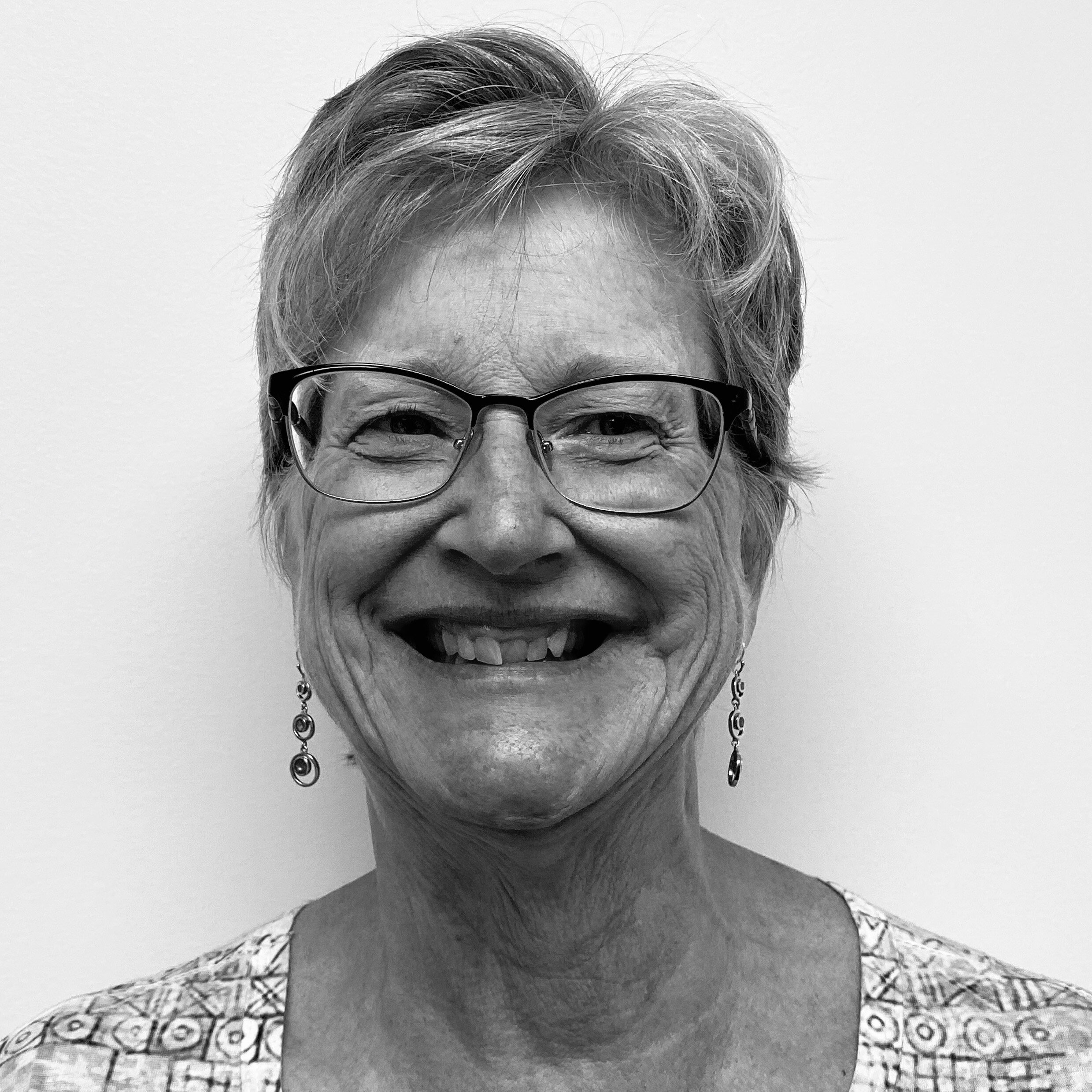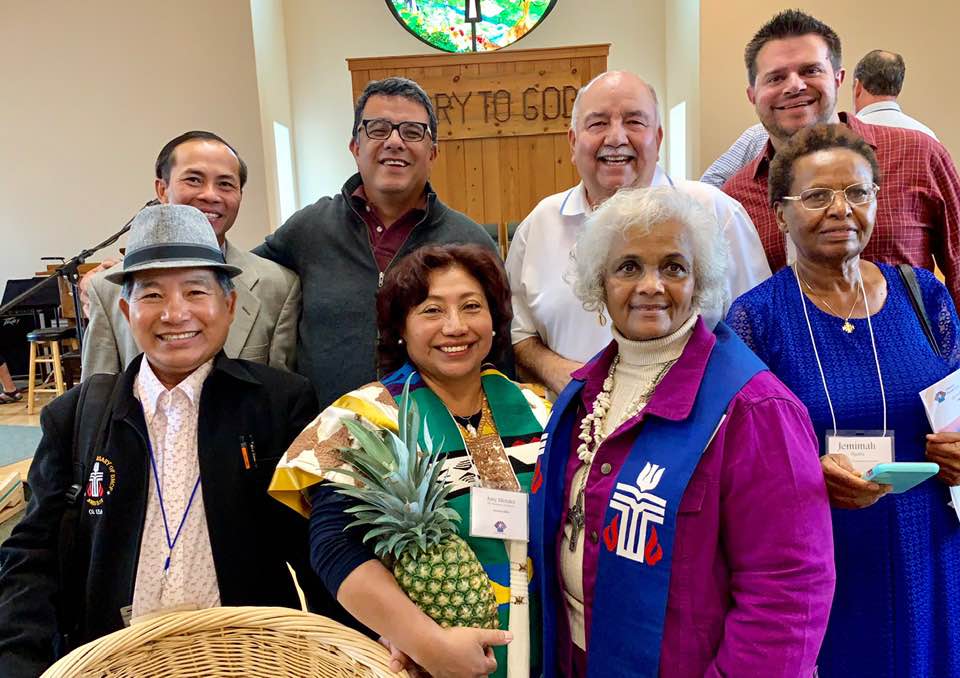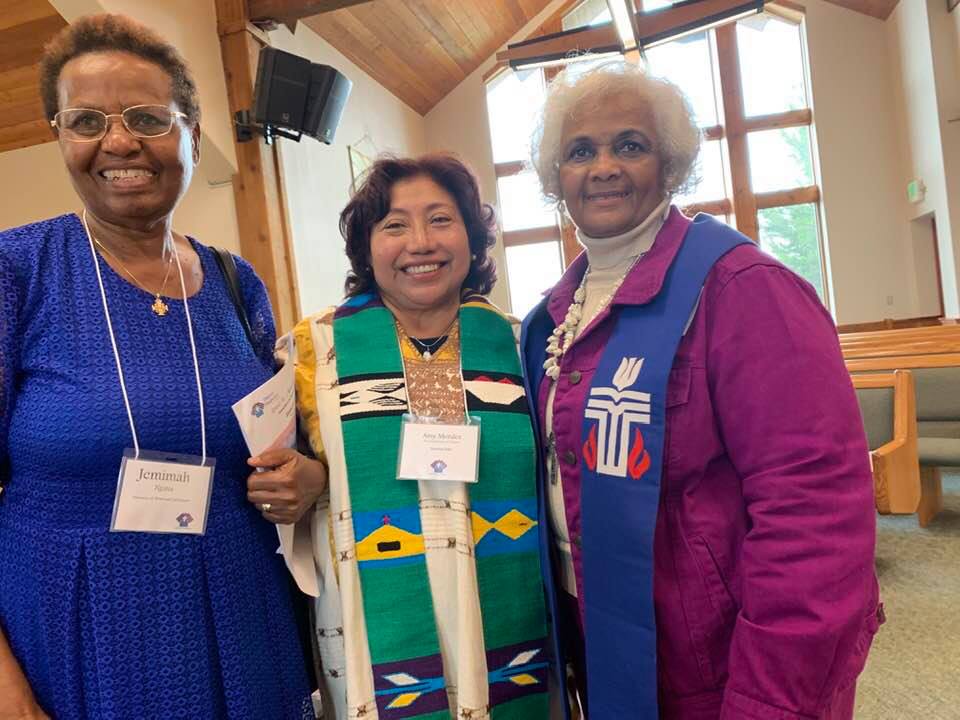October 22, 2019 Stated Assembly Meeting
A special thank you to the volunteers, staff and ministers of Wellshire Presbyterian Church for hosting the October Assembly Meeting. Your hospitality and warm welcome were much appreciated! The music was amazing and we appreciated experiencing your new worship space!
Adrian Miller of the Colorado Council of Churches provider the word and left us all yearning for the mac n cheese recipe with no cook pasta! Do Tell! He left us inspired to to the impossible.
STAND UP | SPEAK OUT | LEAD!
Watch and listen to Adrian Miller, Executive Director of Colorado Council of Churches preaches before our Assembly, based on Ezekiel 37:1-14.
New Faces at Presbytery Office
Sue Pilcher, Treasurer
During the August Assembly at Church of the Eternal Hills in Tabernash, Presbyters voted on the recommendation to elect Susan Pilcher as the Treasurer. Sue, was elected to serve as Treasurer for a three-year term effective August 10, 2019. Elder Pilcher is a member at Grace and has previously served on Presbytery Council. She is the Chief Financial Officer of SafeHouse Denver with responsibility for all finances, accounting, reporting and budgeting functions as well as working with auditors and banking institutions.
Sue can be reached by email: treasurer@denpres.org.
Alan Lane, Accountant
The second new face you will see on Wednesdays and Thursdays at the Presbytery Office is our newly hired in-house accountant, Alan Lane. Alan is a graduate of Texas Tech and has been a Certified Public Accountant since 1985.
Alan can be reached by email at accounting@denpres.org.
Julia Henderson Named Interim Director of Assembly Operations
OFFICE OF THE GENERAL ASSEMBLY
Ruling elder brings experience and energy to new role
Rick Jones | Office of the General Assembly - October 19, 2019
BALTIMORE
The Presbyterian Church (U.S.A.)’s Office of the General Assembly has announced that Ruling Elder Julia Henderson has been appointed interim director of assembly operations, effective November 4. Henderson is stepping into a vacancy created by Tom Hay’s recent departure. Hay retired last month after 11 years in the position.
“I come to this work with a great love for our denomination. It is a love that has grown deeper through each point of connection I have had to a General Assembly,” Henderson said. “At the conclusion of the most recent General Assembly, I told our Stated Clerk, the Reverend Dr. J. Herbert Nelson, II, that I have never felt more proud to be a Presbyterian due to the work that was accomplished in St. Louis. I am incredibly honored to be appointed to this role.”
Henderson will oversee the planning and execution of all logistics connected with the 224th General Assembly meeting in Baltimore next year. Henderson is no stranger to assembly work, having served as a member of the Committee on Local Arrangements for the Denver assembly in 2003. She has also served as moderator of the General Assembly Procedures Committee at the Minneapolis assembly in 2010 and also worked the General Assembly docket desk at the St. Louis assembly in 2018.
“We are excited to have Julia join our team,” said Kerry Rice, OGA’s Deputy Stated Clerk. “We believe she will bring energy and excitement to this role as we look toward the 224th General Assembly.”
Henderson will continue the role through July 2020. Meantime, the search will continue for a permanent replacement with hopes of filling it in time for the gathering.
Click here to read on PCUSA.
San Francisco Theological Seminary's first full-time African American professor
Commemorating 50 years
By Rev. Cornelius O. (“Neil”) Berry Jr. | Special to Presbyterian News Service
SAN FRANCISCO — San Francisco Theological Seminary was established in 1871. In August 1969 under the leadership of President Arnold Come, the trustees of SFTS called the Rev. Dr. Cornelius O. Berry Sr. to join the faculty as their first full-time African American professor. Dr. Berry was an associate professor of systematic theology. He was a faculty member of both SFTS and the Graduate Theological Union located in Berkeley, California. He was also chairman of the Advanced Pastoral Committee and of Area 111 in the GTU until his untimely death in July 1973.
Rev. Berry’s parents left South Carolina in the early 1920s and moved to the Sugar Hill area of Harlem in New York City. They then moved to the southeast Bronx, which was a predominately Jewish community. Dad was born there on Feb. 13, 1926. My father was a product of the New York City public school system, and he skipped three grades. While in the Bronx, he joined the mighty St. Augustine Presbyterian Church at its inception. The Rev. Edler Hawkins was the founding pastor. Edler would later become the first black moderator of the General Assembly of the United Presbyterian Church.
My father was very mischievous as a lad, and one day he went into Rev. Hawkins office and acted up terribly. He then ran out of the church down the streets of the Bronx. My father did not know that Edler had been a track star in college, and he proceeded to catch my father and drag him back to the church by the scruff of his neck. From that day on, my dad was completely devoted to Rev. Hawkins. Rev. Hawkins’ leadership was so great that many of the gifted young men of the Bronx who joined St. Augustine’s decided to become Presbyterian ministers rather than doctors or lawyers. My father was one of these young men, and Rev. Hawkins became a surrogate father to our family.
Dad then attended City College of New York, which was free but highly competitive to get in. He earned his B.A. there and then went on to attend Union Theological Seminary. These were the golden years of Union Seminary of New York with such men as Reinold Neihbur, Paul Tillich and James Muilenburg teaching classes. In his second year at Union, he married his childhood sweetheart and the love of his life, Lois Gwendolyn Palmer. Upon graduation, he took a call to a small Protestant parish in East Harlem. He was then called to Mt. Carmel Presbyterian Church in Newark, New Jersey, where my sister and I were born. He stayed there eight years and while there, he started work on his Ph.D. at Columbia University in New York. He then was called to St. Albans Presbyterian church in Queens, New York, for three years.
These were happy years for my father and mother. These years were made even happier because Dad could frequently visit his only sibling (his two-year-older brother, Creighton Berry) and his family and in Jamaica, Queens. My father and his brother were very close. They were both brilliant in their own ways. Creighton went on to head Gimbels department store’s commercial art department. Gimbels in New York City was the second largest department store in the world at that time. He later founded the Edler Hawkins foundation in New York City for the Presbyterian Church (U.S.A.). He is also considered one of the greatest watercolor artists of his generation.
During this time, he made lifelong friends with the Rev. Clarence Cave and the Rev. Joe Roberts. Clarence became a longtime administrator for ethnic affairs in the General Assembly and was my godfather. Rev. Roberts was honored to be nominated by Daddy King (seven years after his son Martin was killed) to fill the pulpit of Ebenezer Baptist Church in Atlanta.
Dr. Berry was then called in 1961 to the Board of Christian Education in Philadelphia. Dad was only the second black man hired to work for the national church. We were the first black family to live in Merion Station and only because the Quakers sold us a home there. He became a charter member of the Black Presbyterian Union when racial tensions were beginning to rise in the country. Dad’s job at the Board was to fly around the country implementing the newest and the most enriching models of Christian education. To this end, in 1964 he started Vanguard magazine that was sent to the presbyteries and churches of the UPC. In 1963 my sister Alison was born there.
We moved to Alma, Michigan, in 1965, where my father was named the chaplain of Alma Presbyterian College and assistant professor of religion. Dad went down to Montgomery, Alabama, at this time and met and marched with Dr. King. They became friends, and in 1967 he called Dad to discuss his evolving views on the Vietnam War.
In 1969 Rev. Berry received the call to SFTS. He finished his doctoral thesis in nine months and was awarded a Ph.D. in philosophy from Columbia. His thesis was a systematic exercise in proving the existence of the human soul.
When we arrived in Berkeley, Dad stood face to face with the counterrevolution. This caused him a struggle for discernment that any black intellectual born in the 1920s would have. He looked to Tillich’s idea of the “new being” to frame the young people’s quest, in a Christological context.
“Christianity as a religion is not important, for Christianity is more than a religion. It is the New Being that is important. Resurrection is not an event that might happen in some remote future, but it is the power of the New Being to create life out of death, here and now, today and tomorrow. Where there is a New Being, there is a resurrection, namely, the creation into eternity out of every moment of time.” — Paul Tillich
In a surprising move of solidarity with the young people’s movement, he asked if he could have a polished clay peace symbol I had. He had never asked me for anything before in my life. He wore that peace symbol around his neck instead of a cross every day for the rest of his life.
“One of my clearest recollections of my father was when he took us to Jones Beach on Long Island, where everyone from New York and New Jersey vacationed. It was truly amazing to see him swimming against the horizon — he looked like a great white whale. His swimming skills were amazing. The pictures in my mind of him swimming in the ocean are truly epiphanic.” — Author Rev. Cornelius Oliver Berry Jr. (“Neil Jr.”)
Dad’s close friends at the seminary were the Rev. Howard Rice (longtime chaplain of SFTS), the Rev. John Hadsell (longtime administer) and the Rev. Warren Lee (longtime Director of the Advanced Pastoral Department). Rev. Rice and I became great friends during my time as a student at the seminary. One day he called me aside and said, “Neil, your father had a special place in my heart, and he was one of my favorite theologians. He made Tillich understandable to me.”
Upon his death, Dad was working on a book about the black church in America. In 1994 I picked up the baton and took the idea for a course on the history of the black church in America to the African Studies department of the University of Michigan, Flint campus. It was the most popular course in the department, and I taught it there for five years until I took a call to Witherspoon Presbyterian Church in Indianapolis. The course is still taught there to this day.
In conclusion, I would like to quote from the eulogy his good friend and colleague, the Rev. Dr. Benjamin Reist, gave at “The Church by the Side of the Road” in Berkeley in July 1973: “To say ‘poor in spirit’ with reference to my colleague, my friend, and my brother Neil is to utter then a high salute indeed. For Neil’s was that unique kind of poverty of spirit that refused to relinquish the integrity of his own identity in the face of any external definition from left or right, black or white.”
If Dad were alive today, he would be proud to know that the Rev. Dr. Diane Givens Moffett (whose younger brother, Christopher, married his youngest daughter, Alison) was recently named executive director and president of the Presbyterian Mission Agency in Louisville, Kentucky.
Request for Clergy Renewal Grant Application
Denver Presbytery recommends all Sessions maintain a Clergy Renewal (also known as clergy leave or sabbatical) policy for all Ministers of Word and Sacrament who serve their congregation. This policy should be included as part of a Minister’s terms of call. We recommend a 3-month clergy renewal after every 7 years of service. Clergy Renewal is an investment in the long-term future of a congregation and the minister. Denver Presbytery supports that investment by providing Clergy Renewal Grants to assist in funding the time ministers are on leave, defraying the costs of a clergy renewal for congregations. Ministers planning to take clergy renewal in the year 2020 are invited to complete an application and submit a Clergy Renewal Proposal to the Committee on Ministry for consideration.
The grant funding deadline is October 1, 2019 for Clergy Renewal in the year ahead, 2020.
Funding requests may be made by the minister or the Session. The Clergy Renewal Proposal should be approved by the Session prior to submission.
Grants from the Committee on Ministry are prioritized in this manner:
a. Requests from solo-pastors serving a Denver Presbytery congregation.
b. Requests from congregations with fewer than 200 members.
Ministers may request funding for particular activities that pertain to the renewal plan approved by the session.
In the event that ministers from the same congregation request funding, the Committee on Ministry may distribute the grant between the two requesting entities in a proportion that benefits both grant requests.
The minister shall inform the Committee on Ministry of other grants he/she receives.
Clergy Renewal Grant recipients (whether a Session or minister) shall provide the Committee on Ministry a written report on the renewal experience within 3 months of the completion of the clergy renewal time.
The size of a grant in any given year is based on the number of applications received and the amount requested. However, normally no one leave will be funded for more than $10,000. For the 2020 Budget year $50,000 has been requested (proposed budget to be approved at the October Assembly)
To apply, please submit the Clergy Renewal Application (link below) along with a Clergy Renewal Proposal that includes:
Rationale
Timeline
Financial Plan
Benefit to both Minister and Congregation
Thank you for submitting your application and clergy renewal proposal in a timely manner so that it might be considered for funding.
Questions, contact Sandy Safford, Moderator of Committee on Ministry.
2019 August Stated Assembly Meeting
Thank you to Church of the Eternal Hills for hosting our August meeting. We celebrated new staff and elected a new treasurer as Rev. Amy Mendez brought the message of open arms and welcoming.











